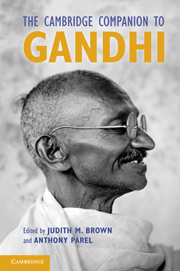1 - Gandhi’s World
from Part I - Gandhi: The historical life
Published online by Cambridge University Press: 28 May 2011
Summary
Mohandas Karamchand Gandhi was born in the Victorian era. He was thus as much a person of the nineteenth as the twentieth century. Born in 1869, only twelve years after the uprising of 1857 that reconfigured British rule in South Asia, he witnessed the acceleration of imperial rule in India as a child and as a young man. His life was lived against the backdrop of the monumental changes that brought the British Empire to the peak of its extent across the globe and then its retraction and demise. During these years, the British harnessed the Indian economy for metropolitan benefit and presided over an increasingly interventionist state. Gandhi was, in many ways, a product of the Victorian age, and made as much use of ships, telegrams, railways, and print as anyone of his generation. Conversely, he quickly perceived the coercive and exploitative nature of British assumptions of supremacy, and the ways in which the fusion of the Indian and British economies was at the cost of the well-being of many Indians. He was an onlooker, seeing through the Victorian world of pomp and ritual splendour to the calculated imperial brutality that it sustained. His was a world of agrarian extraction from the countryside alongside growing urban poverty and sprawl. Gandhi was thirty before his first major political triumphs in South Africa, and nearly fifty before he emerged as a national figure of unrivalled stature on the Indian stage. His ideas were honed during a religious Indian childhood and by his early encounters with the British Empire in its numerous incarnations and guises: from the subtle and indirect influence of culture and language to the face-to-face confrontations with imperial administrators and British officials.
- Type
- Chapter
- Information
- The Cambridge Companion to Gandhi , pp. 11 - 9Publisher: Cambridge University PressPrint publication year: 2011

